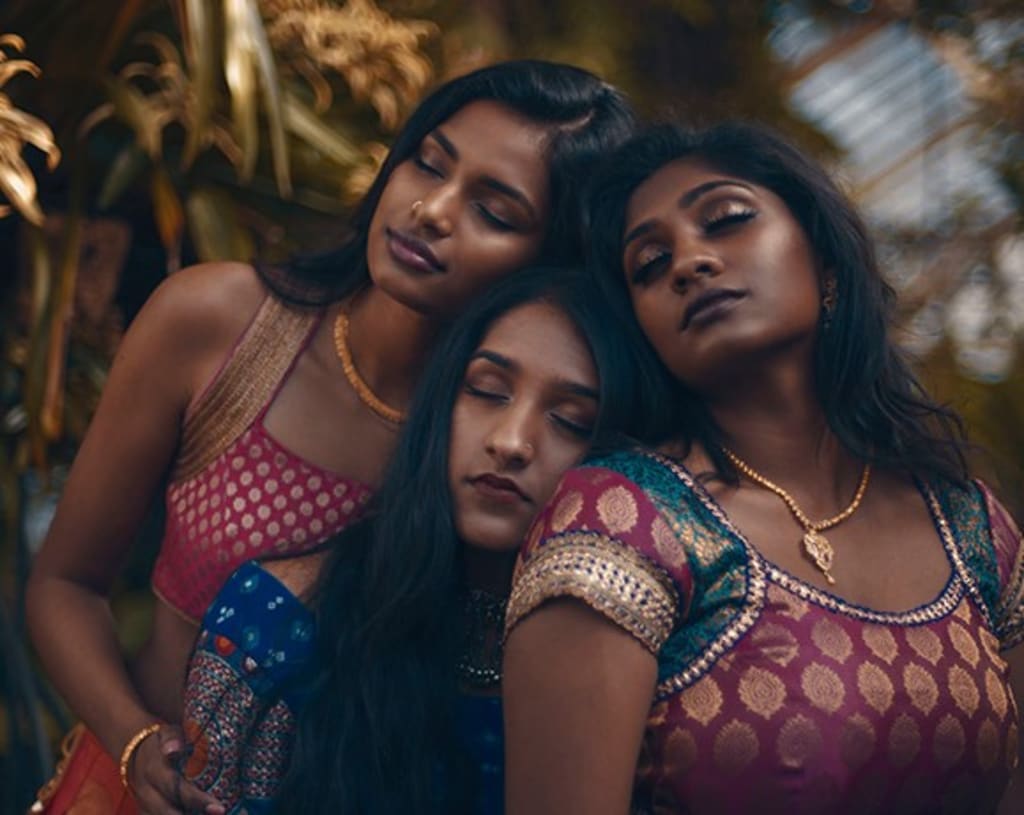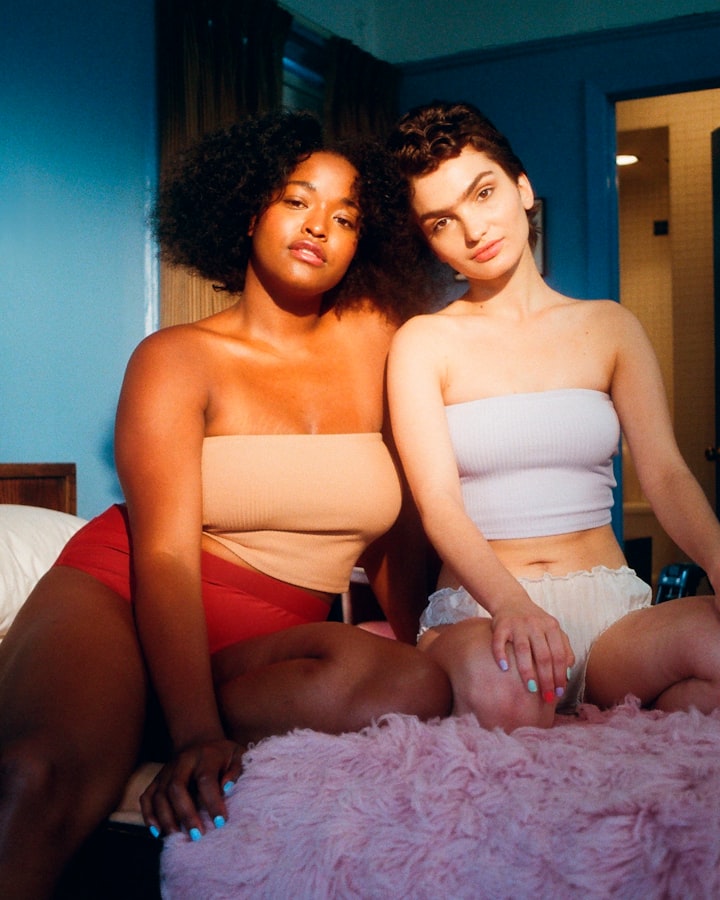"You're Pretty For a Dark Skinned Girl"
Conversations on Colourism

I was going to start this blog post by defining the term ‘colourism’ from the dictionary, however I was quite surprised to find that this term does not exist in the English dictionary. Award-winning author Alice Walker is credited as one of the first people to use the term colourism, defining it in one of her essays in the 1983 book, In Search of our Mothers’ Garden, as “prejudicial or preferential treatment of same-race people based solely on their color.” Racism, in comparison, is discriminatory behaviour or actions towards someone of a different race. Ultimately, both colourism and racism boil down to superiority and feeling that person A is more superior than person B purely based on their skin colour.
Within South Asian communities in particular, colourism takes the form of light skinned people being viewed as more superior than dark skinned people. A number of studies point the origins of colourism within the South Asian community towards British colonial influence, particularly in India, where light skinned workers were consistently favoured by the British over dark skinned workers. Nowadays, being dark skinned is still seen as unfavourable within the South Asian community. Whitening creams are sold in cosmetic stores to increase a person’s ‘fairness’, people tend to avoid the sunlight where possible to mitigate the chances of tanning and therefore being darker, and actresses and celebrities are often photo-shopped to make sure their skin is lighter. From my own experiences, my Pakistani grandmother used to worry about me being in the sun for too long, in case I got a tan and was seen as ‘kaali’, which is a term meaning ‘black’.
Today I’m talking to Jay, a 24 year old Finance Analyst living and working in London. Jay has been brought up in a Tamil household and has recently discovered how much the issue of colourism has tainted her life as a South Asian woman.
Q. Can you tell me some of your experiences as a dark skinned woman within the South Asian community?
When I was born, my Dad’s family, who have quite a dark complexion, had a photo of me as a really light skinned baby. They went around showing it to everyone in their village saying, ‘Look, we’ve got a light skinned baby.’ They were trying to make themselves look good because they had a light skin baby, and if you have a light skin baby, then you’re more superior. When I was young, I never thought anything of it. I just noticed that I started getting called names and people started saying things like, ‘You were so light skin a few years ago, what happened?’ or ‘Oh you’re really dark now.’ The comments always came from someone in the family, and the comments that were not intended to hurt me, that’s just how they see things. When I was growing up, I never had Asian or Tamil friends, so I never got remarks like that from my friends.
As I was growing up, I would see these beautiful light skinned girls and tell my Mum, ‘Why am I not light skinned? I used to be light skinned but now I’ve gone dark.’ When I was growing up, I’d show a happier side to everyone else, but actually I resorted to extreme measures to make my skin lighter. I went above and beyond to make my skin lighter, I used products such as ‘Fair and Lovely’ (a skin whitening product) from the age of ten years old, I would put papaya on my face and use turmeric masks as I was told that these would lighten my skin, I even try to find ways to surgically bleach my skin. I didn’t understand the negative impacts of doing this because my family supported actions like this. Funnily enough, when people would get a tan, they would come up to me and say, ‘Look, I’m your skin colour but slightly lighter’ and I never understood it. It started to process in my brain that to be successful and to do well in life, you have to be slightly lighter. Even when thinking about relationships, I’d think that guys didn’t like me because I’m dark skinned, which is why I always envied people that were lighter than me. Light skinned guys would constantly tell me, “You’re really pretty but you’re just too dark.”
Q. What do you believe it means to be a dark skinned girl in the South Asian community these days?
Being dark skinned has such negative connotations in the South Asian community. It basically means you’re not going to be successful, you’re not going to be paid well enough compared to a light skinned girl, you’re not as pretty as a light skinned girl, you’re less educated. Having a darker complexion is basically not good in the South Asian community.
I distinctly remember a time when one of my friends’ parents saw me and jokingly said something along the lines of, “If she was in the dark, you wouldn’t see her”. My friends’ dad then said that if his son ever married a girl like me, then his kids would be very dark skinned. My friend defended me, of course, but it really harmed my health that day. I never thought that my skin colour would make such an impact on someone who doesn’t know my character. I’ve never met his family, I really don’t know his family like that. Those comments really impacted my mental health.
Q. Can you tell us some of the remarks you have had as a dark skinned Asian woman, and who those comments have been from?
I’ve been called ‘dark beauty’, I’ve been told ‘if you were a bit lighter, you’d look like a superstar or an actress because you’ve got the features for it’ and I’ve been told lots of times that I was ‘pretty for a dark skinned girl’. Last week, someone called me ‘dusky’. I didn’t know what ‘dusky’ meant, but after doing some research I learned that it is another way of saying ‘dark beauty’. It made me really insecure to hear that and I’m 24 years old.
In Britain, we have such a diverse society where you are free to do as you wish and go out with whoever you want, no matter what colour their skin is. This means that a lot of us don’t tend to see the issue of colourism in South Asian communities in Britain. I’ve learnt that I’m privileged and extremely lucky to live in Britain. I don’t get as many back-handed remarks because of my complexion, whereas if you’re living in a South Asian country then you definitely get it worse. In South Asian countries such as India and Sri Lanka, colonialism has embedded the idea into people’s minds that having a darker complexion means you are less superior, that’s why nothing has changed in those countries.
Q. Do you feel like you appreciate your darker complexion nowadays?
I grew to like my own skin in my early twenties. I have embraced my skin colour and I’m happy that I’ve not allowed myself to have a negative mindset anymore. I think Bollywood and Kollywood (Tamil cinema) films caused me to feel this way now because they triggered me. I’ve been watching a lot of these films recently and thinking to myself, ‘What is so bad about being dark skinned?’ The people with darker complexions are always the villain or the back-up dancers, the film producers always make the light skin heroine look better. I don’t know if they’re doing it purposefully, but they make the dark skinned girls look really bad. I’ve always put it aside, but now it’s started to make me think about all the things that have happened to me personally. I have finally embraced the colour of my skin, I’m dark skinned and I love the fact that I am.
Q. Over the past few years in particular, we have seen a significant increase in the number of positive ethnic minority influencers on social media, television and film within Britain. Do you feel that South Asian women have access to positive influences in the community?
Mindy Kaling is the only dark skinned woman I can think of that has lived in America and made a name for herself. Having one person is not enough, because it hasn’t changed the way that the film industry should work in that area. South Asian film and TV producers are more willing to hire a light skinned woman to play a woman of darker complexion rather than just hiring a darker skinned woman to play the heroine role. No matter what, they will always choose dark skinned women to play the less superior or prominent roles.
Recently, there has been a trend on TikTok where South Asian women are taking a clip from a song called ‘Why This Kolaveri Di’ where the lyrics mention ‘white girl skin’ with a ‘black heart’ to show themselves looking sad with their darker skin, then swapping to their lighter complexion and celebrating it. These videos are promoting nothing but toxicity. The people featuring in these videos are creating more hate towards women with darker complexions by promoting videos like this. Whether this is intentional or not, it’s hurting other people’s feelings. The song is a love song and says that the woman has a black heart because she’s heartless – by taking the song out of context and promoting the idea that having darker skin makes you really sad, this devalues our worth as darker women and essentially saying that light skinned women are more superior and happier.
This type of content is part of the reason why women with darker complexions feel the way they do, it makes us question our self-worth and we begin to think that maybe would should try to make our skin lighter because that’s what society wants us to do. This content is creating hate within us and hate towards us as well. These videos do nothing but dehumanises women with darker complexions and makes us feel like less of a person than we already are. Part of the reason why I deleted the TikTok app was because these videos made me so angry. You should love nothing but all tones of the skin. I find it really refreshing to see that we’re not all of the same colour. By determining that my self-worth should be based on my skin colour makes no logical sense – you can’t treat me like shit because I’m dark skinned. I don’t see many strong influencers or role models that are dark skinned that actually talk about colourism or being beautiful in your own skin, especially to young people.
Q. How do you think colourism is impacting younger children in the South Asian community?
To be honest, I’m worried about the next generation of dark skinned girls. There is no one out there to help these kids see otherwise. In Sri Lanka, India, Pakistan, Bangledesh, in all of these South Asian countries, dark skinned girls are perceived as villagers. Being light skinned gets you places, but being dark skinned is associated with being poor and being a lower class. That’s also the reason why you don’t see a lot of dark skinned girls with light skinned guys. I recently overheard a girl of around twelve years old telling her family about wearing lots of makeup to make her skin lighter. She’s only be getting this idea based off her own family and Tamil friends, when they tell her things like, “maybe if you were lighter, you’d look better” or “if you wear a light skin foundation, then you’ll look good.” Another example is when a family relative jokingly said to my younger cousin that she could marry my brother, and she said that she wouldn’t marry him because “he’s too dark.” Now, she’s only ten years old – surely the fact that you are cousins is more messed up than the colour of your skin being too dark? There are very few people in our generation who will help the younger generation out. It really scares me.
Q. What do you think could happen for the situation to improve? What needs to change?
There are some women out there that voice their opinions on being dark skinned and really embrace themselves on social media, but that’s not enough. There are so many women out there who need that influence for them to realise who they are and how beautiful they are. Social media apps like Snapchat and Instagram do not help the situation – women with darker complexions will use filters to make themselves look light and therefore look better temporarily. It will make you look good for two seconds, but it’s going to harm your mental health in the long term. Women with darker complexions need representation. Filmmakers and TV producers need to start opting for dark skinned girls for things to actually change. Darker women on TikTok and Instagram need to start embracing their skin colour.
Having influences to represent dark skinned women will help us to value ourselves better, but that’s just from the surface level – that’s not going to tackle the deeper core of the issue, which is how people within the South Asian community truly perceive dark skinned women and how people think about us. We need to talk about it as a community and we need to be addressing these issues publicly for the sake of our younger generations. This idea that dark skinned girls are less superior has been embedded in the South Asian mindset for centuries, so this is not going to be something that can be sorted with the snap of your fingers. We need to change the way this generation thinks by empowering girls that love themselves and their skin colour to ultimately improve the situation. You can always voice your opinion, but it’s down to you as to whether you want to be a part of it or not.
Q. What would you like to say to all the younger generation of dark skinned girls out there?
I’ve always swept my issues with having a darker complexion under the carpet and I’ve never spoken to anyone about it publicly. I’ve kept it to myself because I’ve always thought that this is the way it is and this is what society will always think, but we need to stop thinking like this for our younger generations within the South Asian community. They are going to have to deal with the same discrimination, but potentially worse because of strong influences like social media, TV and film.
You shouldn’t let anyone judge you based on the colour of your skin, ever. At the end of the day, it is just skin. Unless the way people think does not change, you are always going to get backhanded compliments. What you have to do is embrace who you are and love yourself and ignore those negative comments – and I know it’s really hard to ignore them, but it’s the best way to not harm your health and that is more important than anything else. Being dark skinned shouldn’t be worth anything – it’s just colour. It’s not fair that people will discriminate you on your appearance rather than anything else. You are dark skinned and you are worthy.
Speaking to Jay about the discrimination faced by women with darker complexions in the South Asian community has got me thinking about how things can change progressively. Ultimately, as Jay quite rightly said, conversations like these need to become more common and publicised for real change to start. Dark skinned women need to accept their beauty and worth, step forward and pave the way for younger generations to follow in their footsteps. The film and TV industries, media companies and social media influencers in South Asia need to start taking colourism into account and not be afraid to champion a woman of darker complexion. And perhaps colourism needs to be added to our dictionaries rather than being a term used online to discuss issues that are prominent in not only South Asian communities, but across the globe.
I’d like to thank Jay for taking the time to talk to me about colourism and for bravely sharing her personal experiences of being a woman with a darker complexion within the South Asian community.
About the Creator
Nuriya Shoro
Just a 23 year old woman from London looking to learn about the world.






Comments
There are no comments for this story
Be the first to respond and start the conversation.